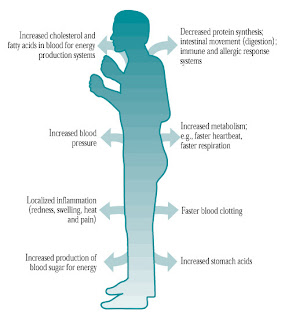Stress is a common experience. We may feel stress when we are very busy, have important deadlines to meet, or have too little time to finish all of our tasks. Often people experience stress because of problems at work or in social relationships, such as a poor evaluation by a supervisor or an argument with a friend. Some people may be particularly vulnerable to stress in situations involving the threat of failure or personal humiliation. Others have extreme fears of objects or things associated with physical threats-such as snakes, illness, storms, or flying in an airplane-and become stressed when they encounter or think about these perceived threats. Major life events, such as the death of a loved one, can cause severe stress.
Stress can have both positive and negative effects. Stress is a normal, adaptive reaction to threat. It signals danger and prepares us to take defensive action. Fear of things that pose realistic threats motivates us to deal with them or avoid them. Stress also motivates us to achieve and fuels creativity. Although stress may hinder performance on difficult tasks, moderate stress seems to improve motivation and performance on less complex tasks. In personal relationships, stress often leads to less cooperation and more aggression.
If not managed appropriately, stress can lead to serious problems. Exposure to chronic stress can contribute to both physical illnesses, such as heart disease, and mental illnesses, such as anxiety disorders. The field of health psychology focuses in part on how stress affects bodily functioning and on how people can use stress management techniques to prevent or minimize disease.



No comments:
Post a Comment